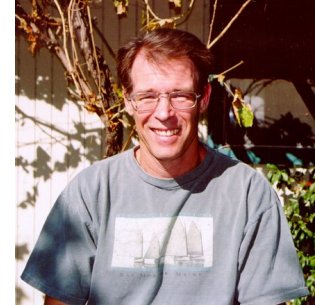 |
|
 |
 |
THE NEWSPAPER OF THE SCIENCE FICTION FIELD
 |  |

|
 |

|
Kim Stanley Robinson: The Years of Rice and Salt |
January 2002 |
|
Kim Stanley Robinson's first novel, The Wild Shore (1984), won the Locus Award for Best First Novel and was the first book in his "Orange County" trilogy, followed by The Gold Coast (1988) and John W. Campbell Memorial Award-winning Pacific Edge (1990). His most celebrated novels form another trilogy, about the terraforming of Mars: Red Mars (1992), which won the Nebula, followed by Green Mars (1993) and Blue Mars (1996), which won the Hugo and Locus Awards. Other works include Antarctica (1997), inspired by his visit there as a writer-in-residence; and short stories, including Nebula-winning "The Blind Geometer" (1986) and World Fantasy Award-winning "Black Air" (1983), collected in The Planet on the Table (1986), Remaking History (1991) and UK Down and Out in the Year 2000 (1992).
His newest novel is The Years of Rice and Salt, to be published in the US and UK in March, 2002. He lives in Davis, California.
|

Photo by Charles N. Brown
Search Amazon.com
for books by Kim Stanley Robinson
|
Excerpts from the interview:
 ëëIíve always been interested in history. I think of science fiction as being about the histories that we cannot know — future, alternative, deep past. These are all historical fictions. So every time you write one you sketch out a kind of theory of how history happens.íí
ëëIíve always been interested in history. I think of science fiction as being about the histories that we cannot know — future, alternative, deep past. These are all historical fictions. So every time you write one you sketch out a kind of theory of how history happens.íí
*
ëëAbout 25 years ago, about the same time I had the idea for ëThe Lucky Strikeí, I had an idea for a scenario where Europe was erased from history around the time of the Black Death. I finally got to it in The Years of Rice and Salt. The ten chapters cross about 700 years, so I had to treat each chapter as a sort of independent novella, linking them with the reincarnation of the characters.íí
*
 ëëIt was fun trying to imagine an alternative Scientific Revolution or birth of science. Without Europe, you still have to postulate that all these things would happen in the human story, either sooner or later. After that blossoming, certain things seem to inevitably follow. In fact, in the later chapters I began to feel almost out of control of my material. I wasnít deciding so much as submitting to the logic of what had gone before.
ëëIt was fun trying to imagine an alternative Scientific Revolution or birth of science. Without Europe, you still have to postulate that all these things would happen in the human story, either sooner or later. After that blossoming, certain things seem to inevitably follow. In fact, in the later chapters I began to feel almost out of control of my material. I wasnít deciding so much as submitting to the logic of what had gone before.
ëëI think of myself as a utopian, and I wanted this novel to suggest that the world could come to a positive balance in the long run, but I thought it would be naive and something like racism in reverse to suggest that if we got rid of Europe the world would have happily put itself together. There are all kinds of double binds in writing an alternative history. Do you make the alternative world better or worse? Either way is unsatisfying, and yet if you make it exactly the same it becomes a pointless exercise. Something has to be said, and yet nothing you say can be adequate. That happened so often in this book that it began to seem to me like nothing but a long set of double binds. But in the end I thought that if, at about the equivalent period of our year 2002, they were faced with a more or less similar set of world problems (environmental, cultures clashing, this sort of thing), and then if I had the novel go about a century further — an interesting shock, after all the years of pastness filling the book — then I could suggest that in this alternative world, they pulled themselves substantially together as a world culture, in what we would call the 21st century. That then exists as a kind of challenge or a utopian statement, but only in the sense that these other people managed to pull it together, theyíve dealt with some of the big ecological problems that face us as well. The book is then a challenge, not a judgment. It was the best I could think of, given the nature of the problem.íí
*
ëëItís interesting how little September 11th changed everybodyís point of view - mine as little as anyoneís, as you can see. Even though it was this horrific event, shocking beyond what we could encompass with our usual media response, in the end everybody still came back with the same politics, the same solutions they had before. It didnít make any fundamental change. People stick with their points of view pretty strongly. In the next ten years, a kind of solution will be cobbled together by what everybody does, and thatís the answer — fumbling forward as best you can.íí
The full interview and biographical profile is published in the January 2002 issue of Locus Magazine.
|
 |

|
 |

